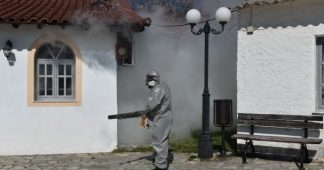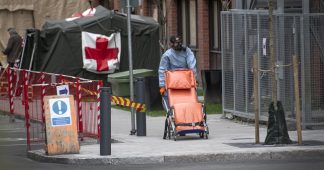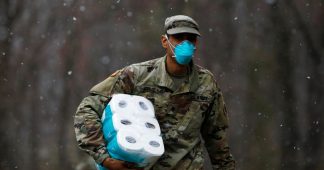By Slavoj Zizek
Oct. 23, 2020
Europe is now paying the price for its summer complacency, when we hoped that coronavirus would be ‘burned’ by the heat. While the epidemic diminished, it did not disappear. Life opened up somewhat, though, and there was a relief that the worst seemed to be over.
Now, in the autumn, when the virus is returning with a vengeance, we can see that the summer heat did all that it was expected to: it stalled the epidemic. Our summer was a brief moment of hope, when we all somehow believed things were returning to ‘normal’.
Everywhere, one could hear warnings about how we should prepare for the second wave, but these warnings were mostly not acted upon. The logic of fetishist disavowal – ‘I know very well, but I don’t really believe it’ – again asserted itself with full force, and now we are surprised that what we expected to happen effectively happened.
And another excuse is falling apart: the claim that, although infections are sharply rising, the death numbers remain low, so we are dealing with a much milder mutation of the virus. Covid deaths are now clearly on the rise in Europe.
At least two smaller European countries – the Czech Republic and my own, Slovenia – are approaching a collapse of the entire health system. In Slovenia, the practice until recently was that, if a doctor or nurse came into close contact with an infected person, they had to quarantine. Now this measure has been canceled; medical workers are obliged to go on working until they show visible signs of illness. Although this is justified by the lack of medical personnel, it opens up the way for the virus to spread freely in hospitals that are already hotbeds of infection.
Also, those who experience Covid symptoms have been told not to even call their doctor, but just to stay at home and wait to see if their situation worsens significantly. Worse still, the state has abandoned the tracing of cases. Individuals who experience symptoms are told they should try to remember who they have been with and inform them to behave carefully. In short, the state is capitulating to the virus.
Throughout the summer, there was a popular argument that lockdowns and quarantines are a medicine worse than the illness itself, that they cause more damage, not only economically, but also with regard to health, thanks to the neglect of cancer and other illnesses.
The basic axiom was to avoid lockdown at any price. The economy cannot afford another extended period of life being put on hold, we were repeatedly told. But this led to a Third Way, to half-baked measures that only partially saved the economy and simply postponed the new outbreak.
Caught between three differing viewpoints – those of medical experts, the business world, and the populist Covid deniers – governments adopted the politics of compromise. They introduced often inconsistent and ridiculously complex half-measures and now we are paying the price for these, which is not only an explosion of new Covid infections, but also the clear prospect of catastrophic economic hardship.
Finally, reality broke through and, now, European governments are openly considering lockdowns if the upward trend of contagion is not reversed. The problem is that, within the socioeconomic coordinates of today’s global capitalism, they cannot afford another lockdown – it would bring unheard-of economic depression and chaos, social unrest, and mental crises. One lockdown is all the global system can take.
So, here we are: the long, hot summer of compromises with the global capitalist order is over, and we are brutally confronted with the reality of what we can try to do to contain the epidemic without disturbing this order too much.
The options of finding a solution within the existing system are exhausted. The situation is hopeless, so there is no hope of a solution within it. One has to summon the courage to openly accept this hopelessness and to envisage radical socioeconomic change: a direct ‘politicization’ (or socialization) of the economy, with a much stronger role for the state, and, simultaneously, a much greater transparency of the state apparatuses themselves for the benefit of civil society.
To provide a general sense of the change that is required, let us look at the four components of the idea of revolutionary justice as it was elaborated by philosopher Alain Badiou: voluntarism (the belief that we can “move mountains,” ignoring “objective” laws and obstacles), terror, egalitarian justice (with no understanding for the “complex circumstances” that allegedly compel us to proceed gradually), and, last but not least, trust in the people.
The mere mention that this idea can have some relevance for our pandemic predicament can’t do anything but trigger horror or laughter: we live in a complex postmodern society, where such procedures are not only ethically unacceptable but have also proven to be inefficient. Really?
My point is not that this vicious spread of the pandemic requires us to invent a new version of these four features, but, rather, a much stronger one: we are already doing it! When crisis hit Cuba after the fall of the Soviet Union, the authorities called this new period ‘the Special Period in Time of Peace’: an era of military discipline, even though there was no war. We laughed at this name, but are we not now all in a ‘Special Period in Time of Peace’? Let’s examine things step by step.
Voluntarism: Even in countries where conservative forces are in power, more and more decisions are taken that clearly violate the ‘objective’ laws of the market: states directly intervene in industry and agriculture, distributing billions to prevent hunger or for healthcare measures. At least a partial socialization of the economy will become even more urgent with the ongoing rise in infections. It’s as in a war: healthcare will have to be expanded and reorganized without regard for the laws of the market.
Terror: Liberals are correct in their fears – although it is not the old ‘totalitarian’ police terror, serious limitations of our freedoms are now a fact of life. Not only are states forced to enact new modes of social control and regulation, but people are even solicited to report to the authorities any family member or neighbor who hides their infection or meets in a large group. In some countries, a night curfew is imposed. In the pandemic, the whistleblower is fully established as the new hero figure. The resistance of those who see informing the authorities about violations of the pandemic rules as something similar to denouncing friends to the police should be treated as a criminal act.
Egalitarian justice. It is commonly accepted that the eventual vaccine should be accessible to everybody, and that no part of the world population should be sacrificed to the virus – the cure is either global or inefficient. Can it be done? As Immanuel Kant wrote apropos duty: “Du kannst denn du sollst” – ‘you can because you ought to.’ Of course there will be a lot of cheating going on, but this cheating should be treated as what it is: a crime that is to be severely punished. States who try to control the eventual vaccine at the expense of others should be treated as rogue states.
Trust in the people: We all know that most of the measures against the pandemic work only if people follow the recommendations, and no state control can do all the work. The appeal to compassion is not enough here; people should be informed about the dangers and also be sufficiently scared to follow the regulations. And, of course, they should not fully trust their state institutions; these institutions themselves should feel the ‘terrorist’ pressure of the people.
Resistance to these measures will persist from all sides, but that is all it is – resistance against what science is telling us. No wonder most of the resistance comes from the populist new right. There is no space for compromise here. We already threw away the precious summer interlude in the search for compromises, and we clearly lost that battle. Now it’s time to act ruthlessly.
* Slavoj Zizek is a cultural philosopher. He’s a senior researcher at the Institute for Sociology and Philosophy at the University of Ljubljana, Global Distinguished Professor of German at New York University, and international director of the Birkbeck Institute for the Humanities of the University of London.
Published at www.rt.com










